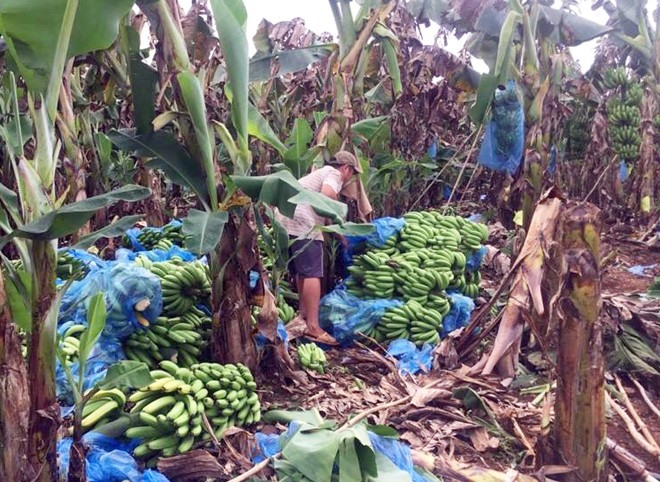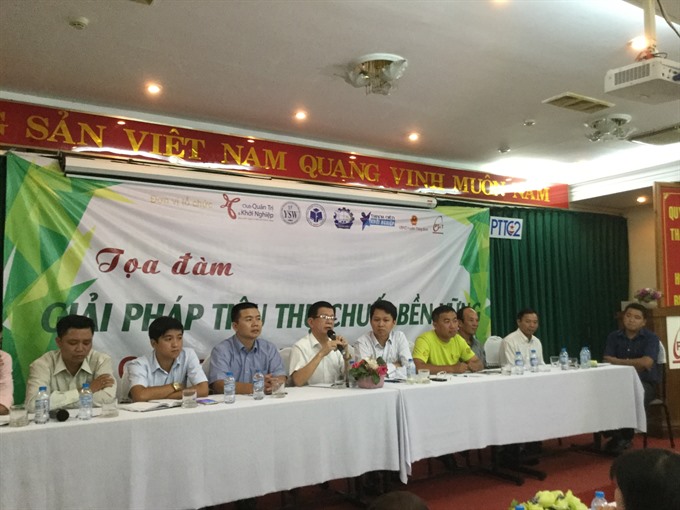 Society
Society

Già Hương and Cấy Mô bananas in Đồng Nai Province have been ready to harvest since February, but traders, mostly in China, have stopped importing the fruit.
 |
| The prices of Già Hương and Cấy Mô bananas have reduced sharply due to low demand in China. Photo: news.zing.vn |
HCM CITY — Già Hương and Cấy Mô bananas in Đồng Nai Province have been ready to harvest since February, but traders, mostly in China, have stopped importing the fruit.
At a forum on sustainable consumption of bananas, Hoàng Thị Bích Hằng, chairwoman of the Farmer’s Union in the province, said that bananas are grown on 700 hectares, mostly in the districts of Trảng Bom, Thống Nhất, Định Xuân and Long Khánh.
Bơm and Sứ bananas are sold for VNĐ5,000-VNĐ7,000 per kilo, Hằng said.
“These kinds of bananas have not faced problems in sales because enterprises in the province buy them to dry for export,” she said.
However, Già Hương and Cấy Mô bananas have not been selling. Their prices have fallen to VNĐ1,000 to VNĐ1,200 (4 to 5 US cents) per kilo, she added.
In the same period last year, the prices were more than VNĐ10,000 per kilo because the demand from China was high. At the end of 2015, bananas in China could not grow because of cold weather.
At that time, many Vietnamese farmers saw higher prices for Già Hương and Cấy Mô bananas compared to Bơm and Sứ bananas so they did not want to plant the latter. Instead, they cut trees and planted Già Hương and Cấy Mô.
According to economists, the demand from China since February has been not high because banana cultivation there has recovered.
Solutions
Prior to the low sales, the provincial agencies had worked with many organisations and associations in the province and HCM City to help farmers.
Big C on March 2 launched its “No Profit Đồng Nai Banana” campaign.
The leading supermarket chain will purchase 100 tonnes of bananas, absorb transportation, logistics and marketing costs, and sell the fruit at retail prices at VNĐ5,900 per kilo at 15 stores around the country with all proceeds going directly to the farmers themselves.
Nguyễn Bách Việt of Sejong Việt Nam Company, which exports bananas to South Korea, said that he also wanted to help farmers in Đồng Nai Province.
In the upcoming days, he will visit farmers to check the quality of bananas and then look for traders in Korea to buy bananas, Việt said.
The Startups and Administration Club has worked with the Việt Nam Social Welfare Centre for Adolescents and universities to organise a campaign called Charity Banana since February 22.
After eight days, around 300 tonnes of bananas were sold to help farmers, but the number accounted for 10 per cent of the total real figure in the province.
In the Trảng Bom District alone, more than 4,000 tonnes are waiting to sell.
Đỗ Long, chairman of the Startups and Administration Club, said: “It is urgent to carry out the campaign now. However, the activities of volunteers are not a sustainable way to produce higher consumption.”
Long said that he had received calls from farmers in the provinces of Tây Ninh and Bà Rịa-Vũng Tàu for help.
Co-operation between enterprises, farmers, scientists and the government should be strengthened, he said.
Long said that he could call on associations with a large number of enterprises in this field to buy bananas from farmers.
Relevant agencies in districts with large areas of bananas will co-operate with authorities at industrial parks and export processing zones to buy bananas to be used as dessert served with lunches for their workers, he said.
Dr Phạm Thanh Duy of the HCM City University of Social Sciences and Humanities said that this was a chance for students to work as volunteers in the campaign as traders for bananas.
They could sell bananas which are verified to meet quality standards by the provincial Technical Centre of Quality Measurement Standards III to convenience shops, Duy said.
Phạm Thái Sơn, head of the centre for enterprises relations at the HCM City University of Food Industry, said the charity campaign could affect prices in markets, meaning that other traders not included in the campaign might find it difficult to sell bananas because prices could be higher than those offered in the campaign.
The school will work with other universities in the food industry and technology to research ways to process bananas into other products, Sơn said.
A student at the University of Food Industry is conducting research to use bananas in the processing of flour. —VNS
 |
| A recent forum in HCM City discusses sustainable solutions for banana consumption. — VNS Photo Gia Lộc |